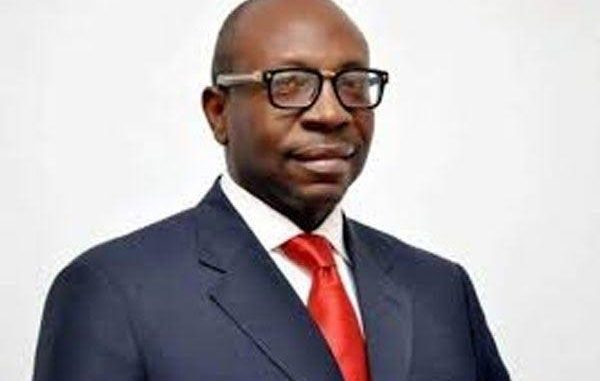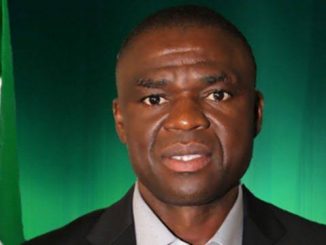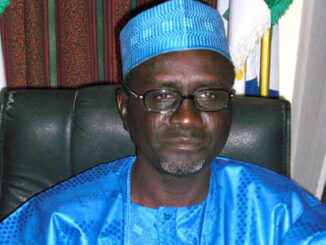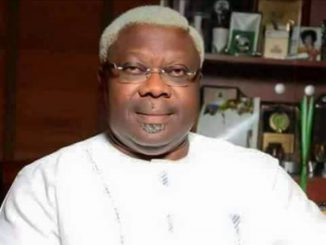
An Edo State High Court sitting in Benin will, on Thursday, June 25, rule whether or not, Osagie Ize-Iyamu, a frontline governorship aspirants of the All Progressives Congress (APC), is a member of the party.
Justice Emmanuel Ahamioje, presiding over the court will also determine the validity of the waiver, the APC National Working Committee granted to enable him participate in the governorship election primary of the party coming up June 22.
Likewise, the Federal High Court in Benin, will on Monday, next week, rule in a separate suit filed, whether Kenneth Asekomhe, factional vice chairman of the APC in Edo State, and Matthew Iduoriyekemwen, disqualified governorship aspirant of the party, have the locus to sustain legal action against the party, both having been expelled from the APC.
The duo, also plaintiffs together with three other chieftains of APC in the state, Benjamin Oghumu, Mathew Ogbebor, and Unweni Nosa, had filled a suit seeking to stop the APC from conducting governorship primary election in the state using the direct mode.
The APC expelled Asekomhe and Iduoriyekemwen from the party last week, saying they violated the constitution of the party by going to court without first exhausting internal dispute resolution mechanism of the party.
The duo, defected to the Peoples Democratic Party (PDP) on Friday, as loyalists of the state governor, Godwin Obaseki, who on Tuesday, resigned his membership of APC, along with his deputy, Philip Shaibu.
ALSO READ: Edo 2020: I’ve officially joined PDP to seek reelection — Obaseki
At the resumed hearing of Friday, June 19, in the suit challenging Ize-Iyamu’s membership of the party, and the waiver granted to him, Justice Ahamioje of High Court 6, said he reserved judgment to June 25, after submissions of the counsel to the parties.
But Justice Ahamioje warned lawyers, politicians and their agents against possible attempts to bribe or blackmail him over the political matter, saying, “Do not give money to anybody on my behalf. I will never send anybody to collect money for me.”
The APC who is the defendants in the suit, alongside its suspended national chairman, Adams Oshiomhole, and Ize-Iyamu, had insisted that the court had no jurisdiction to meddle in the internal affairs of the party, in line with the constitution of APC.
The lead counsel to Ize-Iyamu, Henry Ogbodu, a senior advocate of Nigeria (SAN), in his submission at Friday’s sitting, said that the claimants should stop wasting the court’s time, as he described Obaseki’s loyalists as “busybodies and interlopers, who opted to mischievously harass his client.”
But the APC and Oshiomhole’s lead counsel, Kingsley Obamogie, urged the presiding judge to dismiss the suit for lacking merit, as he insisted that the claimants had no locus standi to file the suit since they were not governorship aspirants of APC.
However, the lead counsel to the plaintiffs, Ken Mozia (SAN), urged Justice Ahamioje to discountenance the arguments of the defendants’ counsel.
In the originating summons, the claimants had asked Edo high court to determine: Whether article 31(2) of APC’s Constitution is not in conflict with Section 177(c) of the Nigerian Constitution as amended, as it relates to the qualification for election to the office of a governor of a state; whether having regard to the provision of Section 177(c) of the Nigerian Constitution, the APC can validly grant a waiver to Ize-Iyamu to make him eligible to contest in the party primaries; and whether having regard to the provisions of Articles 31(2) and Articles 31(3)(ii) of the APC Constitution, Comrade Adams Oshiomhole (and the NWC) can grant a waiver to Pastor Ize-Iyamu, without the approval of the National Executive Committee (NEC) of the APC and without Pastor Ize-Iyamu formally applying for such a waiver through his ward, LGA, state and zonal executive committees of the APC.”
Also, they prayed the court to determine whether “a waiver purportedly granted by Oshiomhole (and the NWC) to Ize-Iyamu on or about 21-5-20 or any other date was in gross violation of Section 177(c) of the Nigerian Constitution and Article 31(2) and Article 31(3) of the extant 2014 amended Constitution of the APC is not null, void and of no effect.”
Then, as the claimants put it, if the four questions were answered in the negative and resolved in their favour, they sought the following reliefs from the trial court: “A declaration that Article 31(2) of APC’s Constitution as amended is in conflict with section 177(c) of the Nigerian Constitution as it relates to the qualification for election to the office of a governor of a state and is therefore null and void. A declaration that having regard to Section 177(c) of the Nigerian Constitution, the APC cannot validly grant a waiver to Pastor Ize-Iyamu to make him eligible to contest the APC primary election, with a view to nominating him as its candidate to contest the 2020 governorship elections in Edo state.”
Alternatively, sought “a declaration that the NWC of APC cannot grant any waiver to Ize-Iyamu to make him eligible to contest the primary election to select the APC candidate without approval of APC’s NEC. A declaration that having regard to the provisions of Articles 31(2) and 31(3)(ii) of the APC’s Constitution, Oshiomhole (and the APC’s NWC) cannot validly grant a waiver to Ize-Iyamu, without the approval of APC’s NEC and without Ize-Iyamu formally applying for such waiver through his claimed ward, LGA, state and zonal committees of APC.”
The plaintiffs also sought “a declaration that any waiver purportedly granted by Oshiomhole (and the APC’s NWC) on 21-5-20 or any other date in gross violation of Section 177(c) of the Nigerian Constitution and Articles 31(2) and Articles 31(3)(ii) of the extant amended 2014 APC Constitution is null, void and of no effect. A declaration that the waiver purportedly granted by the APC’s NWC to Ize-Iyamu to contest the primary election, as scheduled is null, void and of no effect.”
Consequently, the plaintiffs sought “orders of the court restraining Ize-Iyamu from parading himself as an aspirant entitled to participate in the APC primary election fixed for June 22, 2020, from recognising him as an aspirant in the primary election, and from granting him a waiver to participate in the primary.”




